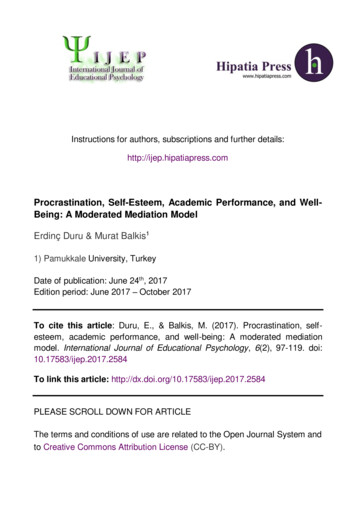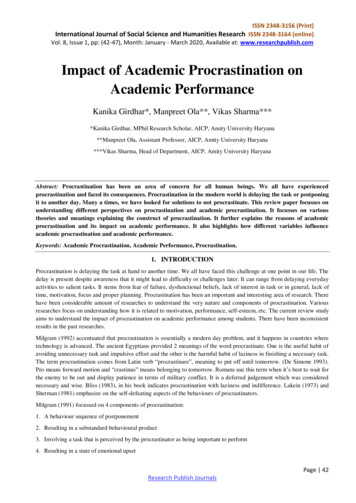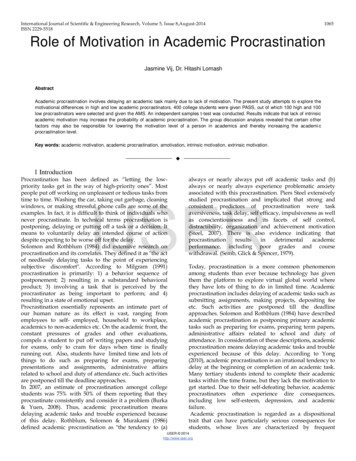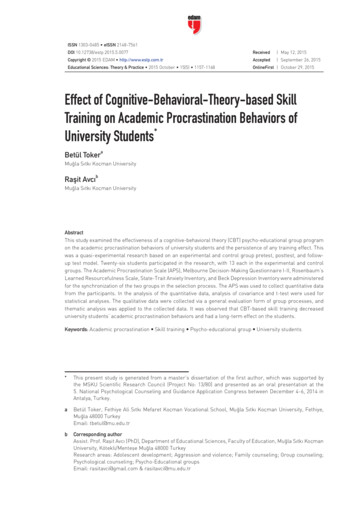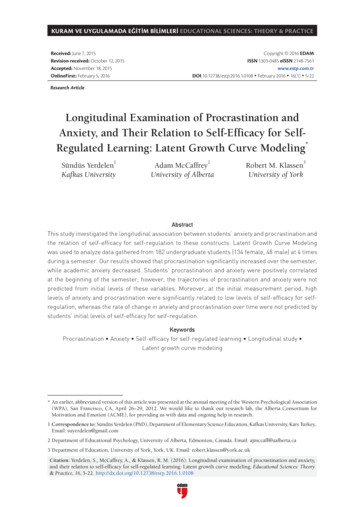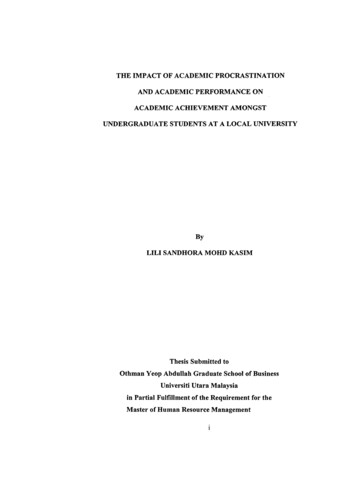
Transcription
THE IMPACT OF ACADEMIC PROCRASTINATIONAM) ACADEMIC PERFORMANCE ONACADEMIC ACHIEVEMENT AMONGSTUNDERGRADUATE STUDENTS AT A LOCAL UNIVERSITYBYLILI SANDHORA MOHD KASIMThesis Submitted toOthman Yeop Abdullah Graduate School of BusinessUniversiti Utara Malaysiain Partial Fulfillment of the Requirement for theMaster of Human Resource Management
nlvorslti Utara Malaysla
DISCLAIMERI declare that the substance of this project paper has never beensubmitted foe any degree or post graduate program and qualifications.I certify that all the supports and assistance received in preparing thisproject paper and all the sources abstracted have been acknowledge in thisstated project paper.LILI SANDHORA MOHD KASIM810931School of Business ManagementCollege of BusinessUniversiti Utara Malaysia06010 SintokKedah Darul Aman
PERMISSION TO USEIn presenting this project paper in partial fulfilment of the requirementsfor a postgraduate degree from Universiti Utara Malaysia, I agree that theUniversity Library make a freely available for inspection. I further agree thatpermission for copying of this project paper in any manner, in whole or inpart, for scholarly purpose may be granted by my supervisor(s) or, in theirabsence by the Dean of Othman Yeop Abdullah Graduate School of Business.It is understood that any copying or publication or use of this project paper orparts of thereof for financial gain shall not be given to me and to UniversitiUtara Malaysia for any scholarly use which may be made of any material frommy project paper.Request for permission to copy or make other use of materials in thisproject paper, in whole or in part should be addressed to:Dean of Othman Yeop Abdullah Graduate School of BusinessUniversiti Utara Malaysia060 10 UUM SintokKedah Darul Imaniii
ABSTRACTThis study aimed to examine academic procrastination and itsrelationship with academic performance among 90 students of 5th semester forthe Landscape & Architecture course of the Faculty of Design andArchitecture of one of the local universities. Gender was considered in thisresearch. After analyzing the data, it was found that participants in the studyexhibited moderate procrastination tendency. This study also found thatacademic procrastination was significantly negatively correlated withacademic performance. Gender variable had no impact on academicprocrastination tendency, but had some impact on the relationship betweenacademic performance and academic achievement. At the end of the paper,limitations and implications of the paper were discussed.Keywords: Academic Procrastination, Academic Performance and AcademicAchievement.
ABSTRAKKajian ini bertujuan untuk menguji perhubungan antara penangguhanakademi dengan prestasi dan pencapaian akademi oleh 90 pelajar jurusanLandscape & Architecture semester ke 5, Faculty of Design and Architecturedi sebuah universiti tempatan. Jantina juga telah dipertimbangkan di dalamkajian ini. Setelah menganalisa data, telah di dapati peserta-pesertamenunjukan kecenderongan yang sederhana kepada sifat penangguhan.Kajian ini juga mendapati penangguhan akademi mempunyai kesan yangnegatif yang besar terhadap prestasi akademi. Jantina tidak mempunyai kesanpada kecenderungan kepada penangguhan akademi, namun begitu ianya adamemberi sedikit kesan terhadap pretasi akademi dan pencapaian akademi. Dipengakhiran kertas kerja ini, kekangan dan implikasi juga dibincangkan.Kata kunci: Penangguhan Akademi, Prestasi Akademi dan PencapaianAkademi.
ACKNOWLEDGEMENTIn the name of ALLAH S.W.T., The Most Gracious and MostMerciful.Alhamdulillah, praised to ALLAH S.W.T. for the completion of thisproject paper. I would like to express my gratitude and appreciation to thosewho helped, supported and encouraged me, and made this accomplishmentpossible.My gratitude and acknowledgment to my supervisor, Puan NorizanHaji Azizan for her professional commitments, guidance and invaluableassistance, as well as to all my course mates and friends who have contributedin one way or other towards completion of this project paper.A truly heartfelt thank you to Azhar Abdul Razak, my loving husbandfor his undivided supports and my understanding children in making thisdream a reality.A special gratitude and appreciation to my late sister, AllahyarhamahMona Lizza binti Mohd Kasim (12 June 1989 to 27 November 2013), She wasa student of the 5th semester of Landscape Architecture course, FacultyDesign and Architecture at University Putra Malaysia (UPM). She was theyoungest in our seven siblings. She had won several competitions includingthe Honor Award for the design titled Atherrnic Ambiance of Malaysian
Landscape Architecture Award 2013. Her discipline and perseverance towardsknowledge is an exemplary. One of her favorite doa was "Ya Allah S.W.T I'mnot seeking for a good academic scores but I'm seeking for a quality ofknowledge".My late sister was greatly involved during distributing the survey paperand compiling information for this research. Without her I could not havebetter access to relevant information and participation to my survey. MayAllah SWT blessed her with Rahmat and Baroqah for all the good deeds shehad done, Al-Fatihah.Finally, my sincere appreciation to every one of my relatives andfiends. There are so many to name names, but you know who you are. Thankyou from the bottom of my heart.vii
TABLE OF CONTENT.DISCLAIMER .11PERMISSION TO USE .111.ABSTRACT. ivABSTRAK . vACKNOWLEDGEMENT . vi.TABLE OF CONTENT . viii.LIST OF TABLES . xi1.LIST OF FIGURES . xi11CHAPTER ONE . 1INTRODUCTION .1Introduction . 1Background of the Study . 1Problem Statement . 8Research Questions . 12Research Objectives . 12Significance of the study . 13Scope and Limitations of the Study . 14Organization of the Thesis . 14.Vlll
CHAPTER 2 . 16LITERATURE REVIEW . 16Chapter Objective. 16Academic Procrastination . 16Factors and Outcomes of Procrastination. 18Academic performance and Academic Achievement . 27Summary . 35CHAPTER 3 . 37METHODOLOGY .37Chapter Objective. 37Research Framework . 37Research Design . 38.Operational Defimt on. 38Measurement of Variables/Instrumentation.39Tuckrnan Procrastination Scale (TPS) .39Academic Performance and Academic Achievement . 40Population and Sampling . 41Data Collection .41Data Collection Procedures . 42
Techniques of Data Analysis . 42Descriptive Statistics . 43Reliability Test . 43Pearson's Correlation Analysis . 43Multiple Regressions . 45Independent Samples t-Test . 45Summary . 453.7CHAPTER 4 . 47RESULTS AND DISCUSSION . 474.0Chapter Objective. 474.1Background of the Respondents . 474.2Detection of Outliers . 494.3Normality Test . 494.4Reliability Analysis . 514.5Results . 524.6Discussion . 624.6.1Findings for Research Objective 1. 2 & 3 . 634.6.2 Findings for Research Objective 4 . 67Summary .X71
CHAPTER 5 . 73CONCLUSION AND RECOMMENDATION . 73Chapter Objective . 73Conclusion. 73Recommendation and Suggestion for Future Research . 74BIBLIOGRAPHY . 76Appendix 1 . 82Appendix 2 .85
LIST OF TABLESTable 3.2:The interpretation of the strength of thecorrelation according to "Guilford Rule of Thumb" 45Table 4.1 :Background of the Respondents41Table 4.2:Normality Test of the Variables52Table 4.3:Reliability Coefficient of the Variables53Table 4.4:Responses to Tuckman's ProcrastinationScale using Frequencies56Table 4.5:Correlation Analysis between AcademicProcrastination, Academic Performanceand Academic AchievementTable 4.6:Correlation Analysis between AcademicProcrastination and Academic AchievementTable 4.7:Analysis between AcademicPerformance and Academic AchievementTable 4.8:Multiple Regression AnalysisTable 4.9:Independent Samples T-Test of AcademicProcrastination and Genderxii
LIST OF FIGURESFigure 1: Research Framework . 37.Xlll
CHAPTER ONEINTRODUCTION1.0IntroductionThis study was conducted to address the issue of academicprocrastination amongst a group of students from a local university. Didacademic procrastination has an impact on academic performance andacademic achievement? Was there a difference in procrastination between maleand female students? Those were the main objectives for this study.1.1Background of the StudyProcrastination is an interactive occussence in which one disregards ordelays a timely attendance to an obligatory assignment or judgment. Thisaction subsequently leads to some potential unpleasant and undesirableconsequences (Balkis & Duru, 2007). This potentially problematic behaviorcan be demonstrated in task performance (i.e., avoidant procrastination) or bydelaying decisions (i.e., decisional procrastination). In addition, procrastinationcan be limited to certain circumstances, as in state procrastination, or canbecome prevalent in most life areas as in chronic or trait procrastination(Schouwenberg, 2004).
The contents ofthe thesis is forinternal useronly
BIBLIOGRAPHYAitken, M. E. (1982). A personality profile of the college studentprocrastinator. University of Pittsburgh: ProQuest Dissertations andTheses. Retrieved Junuary 2 1, 20 12 from untid ll054Alves-Martins, M., Peixoto, F., Gouveia-Pereira, M., Amaral, V., & Pedro, I.(2002). Self esteem and academic performance among adolescents.Educational Psychology, 22,5 1-62.Arbuckle J. (2006). Amos 7.0 user's guide. Amos Development Corporation:Spring House, PA.Balkis, M., & Duru, E. (2009). Prevalence of academic procrastinationbehavior among pre-service teachers, and its relationships withdemographics and individual preferences. Journal of TIzeory andPractice in Education,S (I), 18-32.Bandura, A. (1997) Self-qficacy: The exercise of control. New York, NY:Freeman.Bankston, C. L. & Zhou, M. (2002). Being well vs. doing well: Self-esteemand school performance among immigrant and non-immigrant racialand ethnic groups. International Migration Review, 36, 3 89-4 15.
Berry, C. M. & Sackett, P. R. (2009). Individual Differences in course choiceresult in underestimation of the validity of college admissions systems.Psychological Science, 20, 822-830.Boice, R. (1996). Procrastination and blocking. Westport, CT: PraegerPublishers.Bruinsma, M. & Jansen, E. P. W. A. (2009). When will I succeed in my firstyear diploma? Survival analysis in Dutch higher education. HigherEducation Research and Development, 28,99- 114.Burka, J. B. & Yuen, L. M. (1983). Procrastination: Why you do it, what to doabout it. Menlo Park, CA: Addison-Wesley.Collins, K. M. T., Onwuegbuzie, A. J. & Jiao, Q. G. (2008). Reading ability asa predictor of academic procrastination among African Americangraduate students. Reading Psychology, 29,493-507.Dewitte, S., & Schouwenburg, H. C. (2002). Procrastination, temptations, andincentives: The struggle between the present and the hture inprocrastinators and the punctual. European Journal of Personality, 16,469-489.Dietz, F., Hofer, M. & Fries, S. (2007). Individual values, learning routines andacademic procrastination. British Journal of Educational Psychology,77,893-906.Ellis, A. & Knaus, W. J. (1977). Overcoming procrastination. New York:Signet. Ferrari, J. R., Johnson, J. L. & McCown, W. G. (1995).77
Procrastination and task avoidance: Theory, research, and treatment.NYC: Plenum Press.Flett, G. L., Blankstein, K. R., Hewitt, P. L. & Koledin, S. (1992). Componentsof perfectionism and procrastination in college students. SocialBehavior and Personality, 20, 85-94.Gropel, P. & Steel, P. (2008). A mega-trial investigation of goal setting,interest enhancement, and energy on procrastination. Personality andIndividual Dqferences, 45,406-4 11.Howell, A. J. & Buro, K. (2009). Implicit beliefs, achievement goals, andprocrastination: A meditational anaylsis. Learning and IndividualDfferences, 19, 15 1- 154.Howell, A. J. & Watson, D. C. (2007). Procrastination: Associations withachievement goal orientation and learning strategies. Personality andIndividual Differences, 43, 167-178.Klassen, R. M., Ang, R. P., Chong, W. H., Krawchuk, L. L., Huan, V. S.,Wong, I. Y. F. & Yeo, L. S. (2009). A cross-cultural study ofadolescent procrastination. Journal of Research on Adolescence, 19,799-8 11.Klassen, R. M., Krawchuk, L. L., Lynch, S. L. & Rajani, S. (2008).Procrastination and motivation of undergraduates with learningdisabilities: A mixed-methods inquiry. Learning Disabilities Researchand Practice, 23, 137-147.78
Klassen, R. M., Krawchuk, L. L. & Rajani, S. (2008). Academicprocrastination of undergraduates: Low self-efficacy to self-regulatepredicts higher levels of procrastination. Contemporary EducationalPsychology, 33,9 15-93 1.Klassen, R. M. & Kuzucu, E. (2009). Academic procrastination and motivationof adolescents in Turkey. Educational Psychology, 29,69-8 1.Klibert, J. J., Langhinrichsen-Rohling, J. & Saito, M. (2005). Adaptive andmaladaptive aspects of self-oriented versus socially prescribedperfectionism. Journal of College Student Development, 46, 141-1 56.Mann, L., Radford, M., Burnett, P., Ford, S., Bond, M., Leung, K., Nakamura,H.,Vaughan, G. & Yang, K. (1998). Cross-cultural differences in self-reporteddecision-making style and confidence. International Journal ofPsychology, 33,325-335.National Bureau of Statistics of China. Retrieved from http://www.stats.gov.cnNess, R. V. (1988). Eliminating procrastination without putting ofJ:Bloomington, IN: Phi Delta Kappa Educational Foundation.Orpen, C. (1998). The causes and consequences of academic procrastination: Aresearch note. Westminister Studies in Education, 21,73-75.Owens, A. M. & Newbegin, I. (1997). Procrastination in high schoolachievement: A causal structural model. Journal of Social Behaviorand Personality, 12,869-887.
Prohaska, V., Morrill, P., Atiles, I. & Perez, A. (2000). Academicprocrastination by nontraditional students. Journal of Social Behaviorand Personality, 15, 125-134.Rothblum, E. D., Solomon, L. J. & Murakami, J. (1986). Affective, cognitive,and behavioral differences between high and low procrastinators.Journal of Counseling Psychology, 33,387-394.Salmela-Aro, K., Tolvanen, A. & Nurmi, J. (2009). Achievement strategiesduring university studies predict early career burnout and engagement.Journal of Vocational Behavior, 75, 162-172.Sansgiry, Sujit S.; Kawatkar, Aniket A.; Dutta, ArJun P. and. Bhosle, MonaliJ. (2004). Predictors of Academic Performance at Two Universities:The Effects of Academic Progression. American Journal ofPharmaceutical Education, 68 (4).Schouwenburg, H. C. (2004). Counseling the pi-ocrastinator in academicsettings. DC: American Psychological Association.Solomon, L. J. & Rothblum, E. D. (1984). Academic procrastination:Frequency and cognitive-behavioral correlates. Journal of CounselingPsychology, 31,503-509.Tan, C. X., Ang, R. P., Klassen, R. M., Yeo, L. S., Wong, I. Y. F., Huan, V. S.& Chong,W. H. (2008). Correlates of academic procrastination and students' gradegoals. Current Psychology, 27, 135-144.80
Tice, D. M. & Baurneister, R. F. (1997). Longitudinal study of procrastination,performance, stress, and health: The costs and benefits of dawdling.Psychology Science, 8,454-458.Tuckman, B. W. (1991). The development and concurrent validity of theprocrastination scale. Educational and Psychological Measurement, 51,473-480. Tuckman, B. W. (1998). Using tests as incentive to motivateprocrastinators to study. Journal of Experimental Education, 66, 141147.Vodanovich, S. J. & Rupp, D. E. (1999). Are procrastinators prone toboredom? Social Behavioral and Personality, 2 7, 11- 16Wang, Y. & Luo, J. (2009). A research on impulsivity and delay discountingdifferences between high and low procrastinators. PsychologicalScience (China), F, 371-374.Willford, A. M. (2009). Secondary school course grades and success incollege. College and University, 85,22-33.Zarick, L. M. & Stonebraker, R. (2009). I'll do it tomorrow: The logic ofprocrastination. College Teaching, 57,211-2 15.Zhang, H. & Zhang, Z. (2007). Usability of Tuckman Procrastination Scale inChinese college students. Chinese Journal of Clinical Psychology, 15,10-12.
academic performance and academic achievement. At the end of the paper, limitations and implications of the paper were discussed. Keywords: Academic Procrastination, Academic Performance and Academic Achievement.


